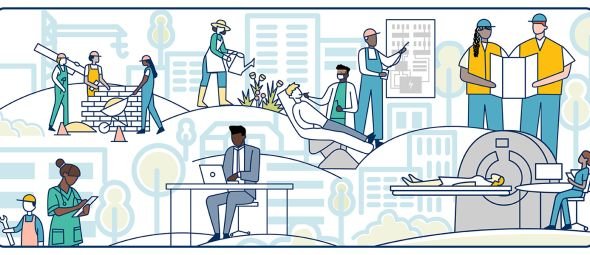Apprenticeship and College: Complementary Approaches to Youth Education and Training
Apprenticeship training and college are often considered substitutes for each other, when they in fact work best as complements. This research and practice summary analyzes administrative apprenticeship data to better understand how colleges have engaged with the apprenticeship system, and the experiences of apprentices in college-sponsored apprenticeship programs.
Read full report
Apprenticeship training and college are often considered substitutes for each other, when they in fact work best as complements. This research and practice summary analyzes administrative apprenticeship data to better understand how colleges have engaged with the apprenticeship system, and the experiences of apprentices in college-sponsored apprenticeship programs.
Grantmaking and Partnerships
Led by a cross-sector Leadership Board that is ideologically diverse and representative of often-siloed groups, WorkRise invests in research on policies, programs, and practices that have the potential to accelerate economic security and mobility for low-wage workers. We fund analyses and the creation of data that shed light on labor market barriers, trends, and opportunities. And we engage in strategic partnerships that help advance evidence-based solutions in support of our mission. Learn more about our most recent request for proposals and how you can collaborate with WorkRise.
The Latest
In Depth

Economic context, Care work, Scheduling
Feature
Last updated on October 24, 2024
Segregation in the Low-Wage Workforce
Over the past 50 years, the composition of the low-wage workforce has changed: more than half of low-wage workers are now people of color, up from just 20 percent in 1971. Today, Black, Latino, and women workers are more likely to be segregated into worse-quality and lower-paying jobs.
WorkRise Research
The Latest
In Depth
Economic context
Last updated on November 20, 2024
WorkRise Manufacturing and Supply Chains Projects
WorkRise has invested in several projects that provide data-driven solutions for policymakers, employers, advocates, and practitioners committed to revitalizing US manufacturing jobs. These initiatives aim to generate meaningful mobility, particularly for younger workers, people of color, and women, who face low wages and systemic barriers to opportunity in this critical field.
Last updated on November 20, 2024
In Depth

Economic context, Care work, Scheduling
Feature
Last updated on October 24, 2024
Segregation in the Low-Wage Workforce
Over the past 50 years, the composition of the low-wage workforce has changed: more than half of low-wage workers are now people of color, up from just 20 percent in 1971. Today, Black, Latino, and women workers are more likely to be segregated into worse-quality and lower-paying jobs.
WorkRise Research

Employer practices, Young workers
Last updated on October 08, 2024
Research Summary
Young Workers Need Support When They Can't Find Their Footing in the US Workforce
During recessions, young workers are less likely to find work and face lower wage growth than more experienced workers. Unemployment Insurance could be reformed to support these young workers as they navigate the labor market amid economic downturns at foundational times in their careers, alongside other policy tools that can be effective in these instances.
Research
Economic context, Scheduling, Mental health
Report
November 20, 2023
Quantifying the Costs of Rising Unemployment
Rising unemployment brings significant costs to workers, their families, social outcomes, and the economy at-large. The contemporary tight labor market provides a good opportunity for researchers to better understand the benefits of low unemployment and thus the risks of high unemployment.
WorkRise Research
Skills and training, Support during upskilling
Executive Summary
November 15, 2023
The Workforce Almanac: A System-Level View of US Workforce Training Providers
The Workforce Almanac, a first-of-its-kind effort to understand workforce training at a systemwide level is a an open-source directory of nearly 17,000 workforce training providers across the United States. This database offers the most comprehensive view to date of US workforce training providers and includes information such as provider names, locations, and types.
Grantee Research
Employer practices, Paid leave
Executive Summary
October 18, 2023
Who Has Access to Paid Sick and Safe Leave?
A new report by Family Values at Work and World Policy Analysis Center charts access to paid sick and safe leave in the US and identifies the most equitable policies in effect.
Grantee Research

Economic context, Economic development, Support during upskilling
Infographic
September 12, 2023
Leveraging Federal Funds to Create Quality Jobs
Do you want better jobs for your community? Through new federal dollars, state and local policymakers have a once-in-a-generation chance to build a new and thriving workforce.
WorkRise Research

